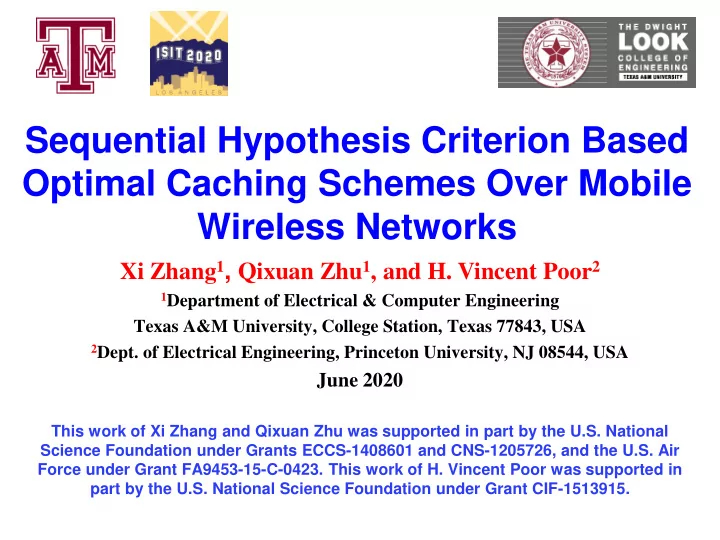

Sequential Hypothesis Criterion Based Optimal Caching Schemes Over Mobile Wireless Networks Xi Zhang 1 , Qixuan Zhu 1 , and H. Vincent Poor 2 1 Department of Electrical & Computer Engineering Texas A&M University, College Station, Texas 77843, USA 2 Dept. of Electrical Engineering, Princeton University, NJ 08544, USA June 2020 This work of Xi Zhang and Qixuan Zhu was supported in part by the U.S. National Science Foundation under Grants ECCS-1408601 and CNS-1205726, and the U.S. Air Force under Grant FA9453-15-C-0423. This work of H. Vincent Poor was supported in part by the U.S. National Science Foundation under Grant CIF-1513915.
Outline Sequential Hypothesis Criterion Based Optimal Caching Schemes in Wireless Networks • Cache design: accurately estimate the future data popularity • Proposed scheme: sequential hypothesis testing to estimate the future Zipf exponent • Exponentially bounded stopping time of sequential hypothesis testing over Zipf distribution • Bounds of stopping time • Optimal solution of sequential hypothesis testing Xi Zhang, Qixuan Zhu, and H. Vincent Poor
Motivations Cache Design in Edge Computing Networks: Accurately estimate the future data popularity and proactively cache the popular data contents. Cache Design Problem Popularity Estimation Scheme Sequential Hypothesis Testing: (1) accept (2) reject (3) continue observations Xi Zhang, Qixuan Zhu, and H. Vincent Poor
Sequential Hypothesis Testing Multiple hypothesis testing: where Define a sequential hypothesis test 1. stopping rule 2. decision rule Xi Zhang, Qixuan Zhu, and H. Vincent Poor
I. Exponentially bounded stopping time: R. A. Wijsman , “Exponentially bounded stopping time of sequential probability ratio tests for composite hypotheses,” The Annals of Mathematical Statistics, vol. 42, no. 6, pp. 1859 – 1869, 1971. Assumption B Xi Zhang, Qixuan Zhu, and H. Vincent Poor
I. Exponentially bounded stopping time: First, we prove Assumption A (ii): where We define: Xi Zhang, Qixuan Zhu, and H. Vincent Poor
I. Exponentially bounded stopping time: Thus, Then, we prove Assumption A (i): Xi Zhang, Qixuan Zhu, and H. Vincent Poor
I. Exponentially bounded stopping time: Assumption A (iii): As long as holds. However, if does not hold, we calculate the probability of is less than 1. Xi Zhang, Qixuan Zhu, and H. Vincent Poor
II. Bounds of stopping time: Define as the probability of selecting Hypothesis j but Hypothesis k is true, for exponentially bounded sequential hypothesis testing as which is equivalent to for every Xi Zhang, Qixuan Zhu, and H. Vincent Poor
II. Bounds of stopping time: Extend the results to converge r-quickly : For , a sequence of of random variables is converge r-quickly, to a constant if , where Xi Zhang, Qixuan Zhu, and H. Vincent Poor
II. Bounds of stopping time: Define We have Xi Zhang, Qixuan Zhu, and H. Vincent Poor
III. Optimal Decision of Hypothesis Testing The optimal solution is the optimal hypothesis that minimizes the problem Xi Zhang, Qixuan Zhu, and H. Vincent Poor
Xi Zhang, Qixuan Zhu, and H. Vincent Poor
Recommend
More recommend